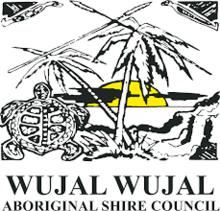The Wujal Wujal Aboriginal Shire is a local government area in Far North Queensland, Australia.[3] It is managed as a Deed of Grant in Trust under the Local Government (Community Government Areas) Act 2004.
| Wujal Wujal Aboriginal Shire Queensland | |||||||||||||||
|---|---|---|---|---|---|---|---|---|---|---|---|---|---|---|---|
| Coordinates | 13°01′08″S 143°14′22″E / 13.0188°S 143.2394°E | ||||||||||||||
| Population | 276 (2021 census)[1] | ||||||||||||||
| • Density | 23.0/km2 (59.6/sq mi) | ||||||||||||||
| Area | 12 km2 (4.6 sq mi)[2] | ||||||||||||||
| Mayor | Bradley Travis Shane Creek | ||||||||||||||
| Council seat | Wujal Wujal | ||||||||||||||
| Region | Far North Queensland | ||||||||||||||
| State electorate(s) | Cook | ||||||||||||||
| Federal division(s) | Leichhardt | ||||||||||||||
 | |||||||||||||||
| Website | Wujal Wujal Aboriginal Shire | ||||||||||||||
| |||||||||||||||
In the 2021 census, the Wujal Wujal Aboriginal Shire had a population of 276 people.[1]
Geography
editIt is on the east coast of the Cape York Peninsula excised from the Shire of Douglas and consists of a single locality, Wujal Wujal which is split into two disjoint areas separated by the Bloomfield River (the river itself remaining part of Shire of Douglas).[4]
History
editKuku Yalanji (also known as Gugu Yalanji, Kuku Yalaja, and Kuku Yelandji) is an Australian Aboriginal language of the Mossman and Daintree areas of North Queensland. The language region includes areas within the local government area of Shire of Douglas and Shire of Cook, particularly the localities of Mossman, Daintree, Bloomfield River, China Camp, Maytown, Palmer, Cape Tribulation and Wujal Wujal.[5]
Yalanji (also known as Kuku Yalanji, Kuku Yalaja, Kuku Yelandji, and Gugu Yalanji) is an Australian Aboriginal language of Far North Queensland. The traditional language region is Mossman River in the south to the Annan River in the north, bordered by the Pacific Ocean in the east and extending inland to west of Mount Mulgrave. This includes the local government boundaries of the Shire of Douglas, the Shire of Cook and the Aboriginal Shire of Wujal Wujal and the towns and localities of Cooktown, Mossman, Daintree, Cape Tribulation and Wujal Wujal. It includes the head of the Palmer River, the Bloomfield River, China Camp, Maytown, and Palmerville.[6]
Demographics
editIn the 2006 census, the Wujal Wujal Aboriginal Shire had a population of 326 people.[7]
In the 2011 census, the Wujal Wujal Aboriginal Shire had a population of 270 people.[8]
In the 2016 census, the Wujal Wujal Aboriginal Shire had a population of 282 people.[9]
In the 2021 census, the Wujal Wujal Aboriginal Shire had a population of 276 people.[1]
Amenities
editThe Wujal Wujal Aboriginal Shire Council operate the Wujal Wujal Indigenous Knowledge Centre at Wujal Wujal.[10]
List of mayors
edit- 2020–present: Bradley Travis Shane Creek[11]
References
edit- ^ a b c Australian Bureau of Statistics (28 June 2022). "Wujal Wujal Aboriginal Shire (LGA)". 2021 Census QuickStats. Retrieved 28 February 2023.
- ^ "3218.0 – Regional Population Growth, Australia, 2017-18: Population Estimates by Local Government Area (ASGS 2018), 2017 to 2018". Australian Bureau of Statistics. Australian Bureau of Statistics. 27 March 2019. Retrieved 25 October 2019. Estimated resident population, 30 June 2018.
- ^ "Local Government (Community Government Areas) Act 2004". Queensland Legislation: In Force. Queensland Government. Retrieved 28 December 2017.
- ^ "Queensland Globe". State of Queensland. Retrieved 5 February 2018.
- ^ This Wikipedia article incorporates CC-BY-4.0 licensed text from: "Kuku Yalanji". Queensland Aboriginal and Torres Strait Islander languages map. State Library of Queensland. Retrieved 28 January 2020.
- ^ This Wikipedia article incorporates CC-BY-4.0 licensed text from: "Yalanji". Queensland Aboriginal and Torres Strait Islander languages map. State Library of Queensland. Retrieved 5 February 2020.
- ^ Australian Bureau of Statistics (25 October 2007). "Wujal Wujal Aboriginal Shire (LGA)". 2006 Census QuickStats. Retrieved 22 June 2024.
- ^ Australian Bureau of Statistics (31 October 2012). "Wujal Wujal Aboriginal Shire (LGA)". 2011 Census QuickStats. Retrieved 22 June 2024.
- ^ Australian Bureau of Statistics (27 June 2017). "Wujal Wujal Aboriginal Shire (LGA)". 2016 Census QuickStats. Retrieved 20 October 2018.
- ^ "Wujal Wujal Aboriginal Shire Council". Public Libraries Connect. State Library of Queensland. 20 September 2016. Retrieved 5 February 2018.
- ^ "2020 Local Government Elections: Saturday, 28 March 2020". Electoral Commission of Queensland. 2020. Retrieved 16 June 2020.[dead link]
